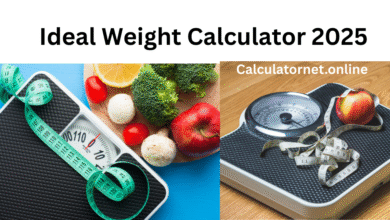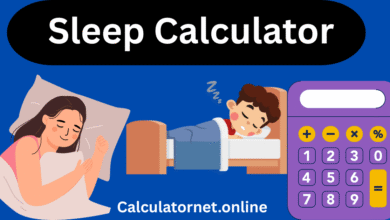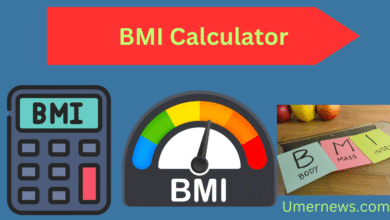Calorie Calculator
Contents
- 1 Calorie Calculator
- 2 Calorie Calculator: Your Key to Weight Loss & Better Health
- 2.1 What Is a Calorie Calculator and Why Use One?
- 2.2 How to Count Calories for Weight Loss
- 2.3 The Quality of Your Calories Matters
- 2.4 FAQ: Your Calorie Counting Questions Answered
- 2.4.1 How many calories do I need to lose weight?
- 2.4.2 What is the minimum number of calories a person needs?
- 2.4.3 Is a calorie calculator accurate?
- 2.4.4 What is the difference between BMR and TDEE?
- 2.4.5 How do I start counting calories?
- 2.4.6 Does the type of food I eat affect my metabolism?
- 2.4.7 Is it okay to have “cheat days”?
- 2.5 The Takeaway
Calorie Calculator

Calorie Calculator
Find your Basal Metabolic Rate (BMR), Total Daily Energy Expenditure (TDEE), and macro targets to reach your fitness goals.
Your Details
Daily Calorie Goal
Calorie Breakdown
Tips & Insights
Your Total Daily Energy Expenditure (TDEE) is 0 kcal.
Water Intake Suggestion
Aim to drink approximately 0 ml (0 oz) of water per day.
Daily Macro Targets
| Macro | % | Grams | Calories |
|---|
Per Meal Macros (3 Meals)
| Macro | Grams | Calories |
|---|
Progress Visualizer
Your goal intake compared to your TDEE:
Support the Developer
If you found this tool helpful, a small donation would be greatly appreciated and help support future projects.
Calorie Calculator: Your Key to Weight Loss & Better Health
Understanding your daily calorie needs is a fundamental step toward achieving your health and fitness goals. Whether you’re aiming to lose, gain, or maintain weight, knowing your numbers provides a clear roadmap. Think of it like a budget for your body—what you spend (burn) versus what you earn (consume). The Calorie Calculator is a powerful tool that helps you estimate these numbers, taking the guesswork out of the equation. This guide will demystify the science behind these calculators and show you how to use them effectively to build a healthier, more sustainable lifestyle.
What Is a Calorie Calculator and Why Use One?
A calorie calculator is a tool that estimates the number of calories your body needs each day to function, based on factors like age, gender, height, weight, and activity level. It helps you determine your Basal Metabolic Rate (BMR), which is the energy your body burns at rest. This BMR is then adjusted with an activity factor to give you a more accurate total daily energy expenditure (TDEE).
By understanding your TDEE, you can create a calorie deficit to lose weight or a surplus to gain weight. For example, a common guideline is to create a deficit of 500 calories per day to lose about one pound per week, as 3,500 calories equals approximately one pound.
The Science Behind the Numbers
Most calorie calculators use well-established formulas to determine your BMR. The most common include:
- Mifflin-St Jeor Equation: Considered the most accurate for the general population.
- Revised Harris-Benedict Equation: A classic formula, revised in 1984 for improved accuracy.
- Katch-McArdle Formula: This one is especially accurate for individuals who know their body fat percentage, as it takes lean body mass into account.
These equations provide a scientific starting point, but remember they are estimates. Your personal needs can vary slightly, and consistent tracking is key to making adjustments.
How to Count Calories for Weight Loss
Counting calories can seem daunting, but it’s a straightforward process when broken down into a few simple steps. The goal is to track your intake so you can make informed choices about your food.
- Determine Your Caloric Needs: Use a calorie calculator to find your BMR and TDEE. This is your baseline. Remember, for weight loss, you’ll need to eat fewer calories than your TDEE.
- Set a Realistic Goal: Aim for a sustainable calorie deficit, typically 500-1000 calories per day, which translates to a weight loss of 1-2 pounds per week. Losing weight too quickly can be unhealthy and may lead to muscle loss and a slowed metabolism.
- Track Your Intake: Use a food diary, a spreadsheet, or one of the many user-friendly apps available on your smartphone. These apps often have large databases of foods and can help you easily log your meals.
- Monitor Your Progress: Weigh yourself consistently (once a week is a good rhythm) and take note of how your body feels. Adjust your calorie goals as you go, and don’t forget to take into account non-scale victories, like how your clothes fit.
The Zigzag Calorie Cycling Method
If you hit a weight loss plateau, you might consider zigzag calorie cycling. This method involves alternating high-calorie and low-calorie days to keep your body from adapting to a consistent deficit. For example, instead of eating 2,000 calories every day, you might have two days at 2,300 calories and five days at 1,775 calories. The total weekly calories remain the same, but the variation can help stimulate weight loss and give you more flexibility.
The Quality of Your Calories Matters
While the “calories in, calories out” principle is the foundation of weight loss, the quality of those calories is just as important. Not all calories are created equal.
- Nutrient-Dense Foods: Focus on whole, minimally processed foods like vegetables, fruits, lean proteins, and whole grains. These foods are rich in nutrients, fiber, and protein, which can help you feel fuller for longer.
- Empty Calories: Be mindful of “empty calories” found in sugary drinks, processed snacks, and fried foods. They provide energy but offer little to no nutritional value and can leave you feeling hungry shortly after eating.
For example, 500 calories from chicken and vegetables will satisfy you more and provide far better nutrition than 500 calories from a bag of potato chips. Choosing healthier, nutrient-dense foods not only supports weight loss but also improves your overall health.
FAQ: Your Calorie Counting Questions Answered
How many calories do I need to lose weight?
This depends on your specific stats (age, gender, height, etc.). Use a calorie calculator to find your TDEE and then subtract 500 calories for a safe, effective weight loss of about one pound per week.
What is the minimum number of calories a person needs?
According to Harvard Health Publications, women should aim for at least 1,200 calories per day, and men should consume at least 1,500 calories per day, unless under a doctor’s supervision. Consuming too few calories can be detrimental to your health.
Is a calorie calculator accurate?
Calorie calculators provide a great estimate, but they are not perfect. They use scientific formulas based on averages. Your personal metabolism and daily activity levels can vary, so it’s important to use the result as a starting point and adjust based on your body’s response.
What is the difference between BMR and TDEE?
BMR (Basal Metabolic Rate) is the number of calories your body burns at rest, simply to perform basic functions like breathing and circulation. TDEE (Total Daily Energy Expenditure) is your BMR plus the calories you burn through physical activity.
How do I start counting calories?
Start by using a calorie calculator to get your target number. Then, use a food tracking app or a simple journal to log everything you eat and drink. Focus on being consistent and honest with your tracking to see the best results.
Does the type of food I eat affect my metabolism?
Yes, certain foods, especially those that are high in protein and fiber, can increase your metabolism. The “thermic effect of food” refers to the energy your body uses to digest, absorb, and metabolize food. Protein and fiber have a higher thermic effect than fats and carbohydrates.
Is it okay to have “cheat days”?
Yes, cheat days or meals can be a helpful part of a sustainable diet. Zigzag calorie cycling, in particular, builds in flexibility. The key is to account for the extra calories consumed and balance them out throughout the week to stay on track toward your goals.
The Takeaway
The Calorie Calculator is a valuable tool to help you understand your body’s energy needs and create a plan to reach your goals. By combining this knowledge with smart food choices and consistent tracking, you can take control of your health. Remember, the key to success is finding a method that works for you and your lifestyle.
What are your experiences with calorie counting? Share your tips and questions in the comments below!





